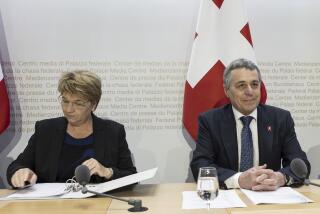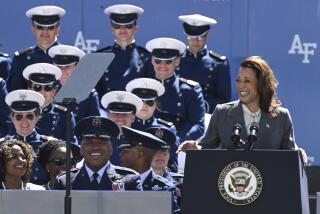Key Arab nations to attend Israeli-Palestinian conference
- Share via
CAIRO, Egypt — Saudi Arabia and other key Arab nations Friday agreed to attend a U.S.-sponsored peace conference, a move that added credibility to Washington’s attempt to resolve the Palestinian-Israeli conflict before President Bush leaves office.
The political guessing game over what countries would participate ended here when the Arab League announced that Cabinet-level representatives from its major states, with the exception of Syria, would travel next week to the summit in Annapolis, Md. The critical nod came from Saudi Arabia, a strong U.S. ally, which overcame its reservations and indicated that Foreign Minister Prince Saud al-Faisal may attend.
“I’m not hiding any secret about the Saudi position. We were hesitant until today,” Faisal said at a news conference following the Arab League meeting. “As long the Arab position has agreed on attending, the kingdom will walk with its brothers in one line.”
Those calculated words capped months of shuttle diplomacy by Secretary of State Condoleezza Rice, who urged Arab leaders to put aside misgivings that Tuesday’s summit would be little more than a photo-op by an outgoing U.S. president whose policies have failed across the Middle East. Rice persuaded Egypt and Jordan, and with their help, gained the endorsement of Saudi Arabia, which Washington regards as the decisive voice in the Arab world.
“This is a signal they believe this will be a serious and substantive meeting,” said State Department spokesman Leslie Phillips. “The Annapolis conference will show broad international support for the Israeli and Palestinian leaders’ efforts and will be a launching point for negotiations leading to the establishment of a Palestinian state and the realization of Israeli-Palestinian peace. We look forward to as full a participation as possible from all invitees and we look forward to seeing them all in Annapolis this Tuesday.”
But the mood at the Arab League headquarters was more wary than ebullient. Diplomats attempted to burnish a united Arab front, but few were predicting the United States would put enough pressure on Israel to force lasting concessions leading to an independent Palestinian state. Bold statements mixed with sober assessments that the conference’s ambitions had been scaled back from solving the Middle East peace crisis to creating an agenda for future talks.
“What is the objective of this conference?” said Saeb Erakat, a chief Palestinian negotiator. “To avoid high expectations, the objective ... as specified by the invitation is to launch the final status negotiations on the Palestinian-Israeli track.”
Syria, an ally of Iran, did not commit to the conference. It has stated that it would only go if Israel’s return of the Golan Heights, which it captured from Syria in the 1967 war, was specifically addressed.
But by late Friday it seemed that Syria was leaning toward attending. Syrian media quoted Foreign Minister Walid al-Moualem as saying that the United States has agreed to add the Golan Heights to the agenda.
“We have not decided whether to participate or not,” said al-Moualem. “We are waiting to receive the agenda and to see whether it has the Syrian-Israeli track which means the Golan Heights as the second item.”
The political risks for Arab nations is a meeting that produces more rhetoric and picture-taking than timetables and other measures needed to secure Israeli agreements for an independent Palestinian state. The leaders of Saudi Arabia, Jordan and Egypt, who are viewed by their populations as beholden to Washington, worry their images will suffer if emissaries fly home with little or no Palestinian gains.
That sentiment is particularly strong in Saudi Arabia, which has no diplomatic relations with Israel and is uneasy about sitting with Israelis at a high-stakes gathering. The Saudis have been frustrated by the failure of the so-called Israeli-Palestinian road map for peace begun in 2002. In recent days, President Bush called Saudi King Abdullah. That conversation and assurances by Riyadh’s Arab allies reportedly convinced the king that the conference was worth the gamble, especially if it meant that not attending would leave the Saudis embarrassed if progress was made.
More to Read
Sign up for Essential California
The most important California stories and recommendations in your inbox every morning.
You may occasionally receive promotional content from the Los Angeles Times.














